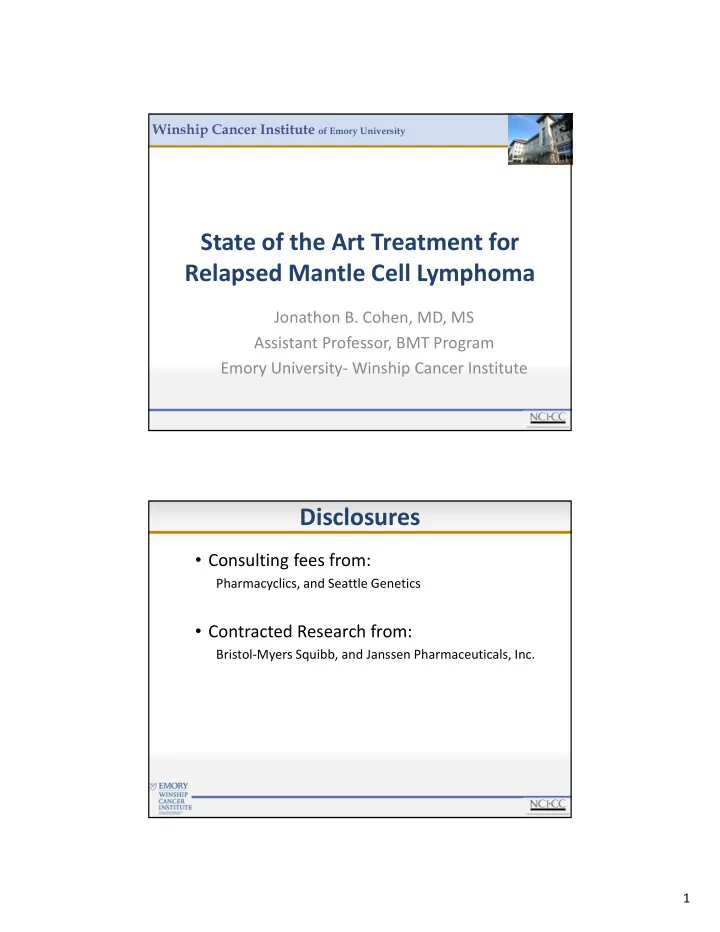

Winship Cancer Institute of Emory University State of the Art Treatment for Relapsed Mantle Cell Lymphoma Jonathon B. Cohen, MD, MS Assistant Professor, BMT Program Emory University ‐ Winship Cancer Institute Disclosures • Consulting fees from: Pharmacyclics, and Seattle Genetics • Contracted Research from: Bristol ‐ Myers Squibb, and Janssen Pharmaceuticals, Inc. 1
Outline • Current Responses to Front ‐ line Therapy • Evaluation of the Relapsed Patient • Approved Therapies – Ibrutinib – Bortezomib – Lenalidomide • Investigational Agents • Stem Cell Transplantation • Conclusion/Recommendations Mantle Cell Lymphoma ‐ Background • < 10% of cases of NHL • Characterized by: – CyclinD1 positivity by IHC – Immunophenotype: CD5, CD20, CD23+ – t(11;14) • Frequently Stage IV • Bone Marrow Involvement • Peripheral Blood Lymphocytosis • Spleen • GI Tract 2
Prognostic Markers • MCL International Prognostic Index (MIPI) – WBC Count – Age – LDH – Performance Status • Ki67 proliferative index • Cytogenetics – Complex Karyotype – Del(17p) • Mutations (ie, NOTCH1) Hoster et al, Blood 2008; Hoster et al J Clin Oncol 2014; Hsi et al Leuk Lymphoma 2008 Sarkozy et al, Genes Chromosomes Cancer 2014; Cohen et al ASH 2012; Kridel et al Blood 2012 Front ‐ Line Approaches • No Standard of Care • Cytarabine ‐ containing regimens and autologous stem cell transplant appear to be important • Median Event ‐ free survival 83 months with CHOP/DHAP + Rituximab + Transplant • Emory Experience: – HyperCVAD + ASCT: 5 ‐ year OS 76% • Nearly all patients will eventually relapse Delarue et al, Blood 2013; Murali et al, BMT 2008 3
Evaluation of the Relapsed Patient • Outcomes for relapsed patients are historically poor • Considerations – Duration of relapse – Prior regimens received – Fitness / Motivation for Therapy – Appropriateness / Interest in Clinical Trial – Feasibility of Allogeneic Transplant Dietrich et al, Ann Oncol 2014 Salvage Options Dreyling, ASCO 2014 Educational Book 4
FDA Approved Therapies: Ibrutinib • Orally available BTK inhibitor • Standard MCL Dose: 560mg daily • Toxicities: – Diarrhea – Rash – Fatigue – Mild Cytopenias / Increased Risk for Infection – Bleeding Complications • Generally very well tolerated • Peripheral lymphocytosis is expected Ibrutinib ‐ Efficacy • Median Duration of Response: 17.5 month • Median Overall Survival: Not Reached Wang et al, NEJM 2013 5
Lymphocytosis with Ibrutinib • In CLL, peripheral lymphocytosis is not associated with poor response or PFS • Responding pts should continue therapy. • No apparent risk to patients. Woyach et al, Blood 2014 Mechanisms for Ibrutinib Resistance Woyach et al, NEJM 2014 6
FDA Approved Therapies: Bortezomib • Phase II Study: 1.3mg/m 2 days 1, 3, 8, and 11 • Overall Response Rate: 33% • Median Duration of Response: 9.2 months • Median Overall Survival: 35.4 months Fisher et al, J Clin Oncol 2006; Goy et al Ann Oncol 2009 Bortezomib • Peripheral Neuropathy – 13% Grade ≥ 3 in Phase II Study • GI Side Effects • Thrombocytopenia – 11% Grade ≥ 3 • Zoster Reactivations 7
FDA Approved Therapies: Lenalidomide • Approved for use after bortezomib • EMERGE Study: – 25mg orally days 1 ‐ 21 of a 28 day cycle – Overall Response Rate: 28% – Median Duration of Response: 16.6 months Goy et al, J Clin Oncol 2013 Investigational Agents • All patients should be considered for eligibility for clinical trials • Agents under investigation – Idelalisib (PI3 δ‐ kinase inhibitor) – mTOR inhibitors – Novel proteasome inhibitors – Novel combinations – Others 8
Idelalisib • Oral PI3 ‐ kinase inhibitor • Phase I Study in relapsed/refractory MCL: – Overall Response Rate 40% – Median duration of response 2.7 months Kahl et al, Blood 2014 Idelalisib ‐ Single Agent Toxicities • Transaminitis (20% Grade ≥ 3) • Diarrhea (17.5% Grade ≥ 3) • Anorexia (15% Grade ≥ 3) • Pneumonia (10% Grade ≥ 3) • Nausea, Fatigue, Rash (All 5% or less Grade ≥ 3) • 18% of patients required discontinuation of therapy due to toxicity Kahl et al, Blood 2014 9
Everolimus/Temsirolimus • Phase II Study of Everolimus in Patients Relapsed after Bortezomib – 10mg daily dosing – Overall Response Rate: 10.3% – Median PFS: 5.3 months • Temsirolimus – Currently studied in a phase III study – Phase II Response rates: 38 ‐ 41% Wang et al, B J Haematol 2014; Dreyling ASCO Educational Book 2014 Carfilzomib/Ixazomib • Novel proteasome inhibitors • May have benefit in bortezomib ‐ resistant cases • Lower incidence of neuropathy • Ixazomib to be evaluated at Emory in the setting of post ‐ transplant maintenance. 10
Stem Cell Transplantation • No standard role for stem cell transplantation in management of relapsed MCL • Allogeneic transplant may provide long term remission but is associated with toxicity. • CIBMTR: RIC allo v auto: Fenske et al, JCO 2014 Stem Cell Transplantation • Allo transplant has increased rate of non ‐ relapse mortality: – 17% 1 ‐ year NRM for patients undergoing allo transplant after relapse. – Among all deaths, leading causes include: • Disease (30%) • Infection (17%) • GVHD (15%) • Organ Failure (11%) Fenske et al, JCO 2010 11
Relapsed MCL Proposed Algorithm Conclusions • Nearly all patients with MCL will relapse • Ibrutinib now “standard” first option for relapsed patients • Bortezomib and Lenalidomide also option • Ibrutinib is not curative; clinical trials should be considered • Healthy, motivated patients should be referred for consideration of allo transplant 12
Future Directions • How to manage patients who received ibrutinib in first line. • Identification of patients unlikely to respond to therapies. • Optimal integration of transplant into management of relapsed patients. THANK YOU QUESTIONS? 13
Recommend
More recommend